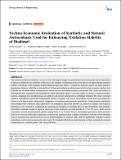| dc.description.abstract | The oxidation stability of biodiesel is a critical factor affecting its storage and performance, necessitating the use of antioxidants to enhance its shelf life and reliability. Both natural and synthetic antioxidants have proven effective in improving the oxidation stability of biodiesel, with numerous studies demonstrating their ability to extend the induction period and delay oxidative degradation. However, while the technical efficacy of these antioxidants is well‐documented, the techno‐economic analysis that evaluates the cost‐effectiveness of using natural versus synthetic antioxidants remains unexplored. This creates uncertainty in selecting the most sustainable and economically viable antioxidant option. This study aimed to conduct a techno‐economic analysis comparing the cost‐effectiveness of synthetic and natural antioxidants in stabilizing biodiesel. The study evaluated synthetic antioxidants, specifically hydrogenated methoxy eugenol, and natural antioxidants derived from the methanolic extract of wild loquat plants, along with a comparison to commonly used synthetic antioxidants. Comprehensive simulations and modeling were conducted using Aspen Plus® V10 commercial simulation software in a block‐wise manner. The technical performance was assessed by considering the quantities and qualities of biodiesel, glycerol, and antioxidants. The synthetic antioxidant processes resulted in negative net present values and longer payback periods of 11.7 to 17.8 years, while natural antioxidants showed shorter payback periods ranging from 3.8 to 12 years. Natural antioxidants, particularly those extracted from clove wastes and wild loquat plant parts, demonstrated superior techno‐economic performance with the lowest operating and raw materials costs, shortest payback period, highest internal rate of return (IRR), and best profitability. Therefore, natural antioxidants are the most economically viable option for biodiesel stabilization, outperforming synthetic antioxidants in terms of operating costs, payback period, IRR, and profitability. | en_US |

